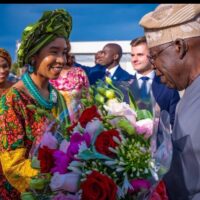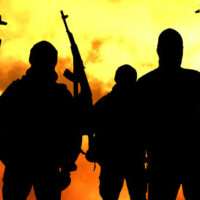Jonathan Vs Buhari: The Make Or Mar Election
Jonathan Vs Buhari: The Make Or Mar Election
Monday, March 23, 2015 12:36 pm
How The Candidates Stand
Had the presidential election held on the earlier scheduled date of 14th February, many are of the belief that the candidate of the opposition APC would have thoroughly trounced candidate Jonathan of the PDP. However, the six weeks shift in the polls and the successes recorded so far by the Nigerian troops against the Boko Haram bought for the President some sort of manouvering space as he has been able to restrategize and retool his campaign drives.
A global political risk and consulting firm, Eurasia, earlier in the wake of these successes by the Nigerian troops against the insurgents, had upgraded its short-term trajectory on Nigeria from negative to neutral and had projected that President Jonathan has a 75-percent chance of re-election. However, following recent developments in the polity ahead of the rescheduled polls, the firm, last week, changed its earlier forecast to indicate that there is a 60% probability that the opposition leader, Muhammadu Buhari, could beat President Goodluck Jonathan in this month’s election.
“We had long viewed Goodluck Jonathan as a favorite to win re-election, but a number of factors now lead us to believe the edge has swung in Buhari’s favor. The election will still be difficult to call, but our expectation of a narrow Jonathan win was predicated on several factors that are losing some saliency late in the campaign. Chief among them is the incumbency and financial advantages of the ruling Peoples Democratic Party, PDP. While this still helps Jonathan, its impact is blunted by the intensity of support for Buhari, lackluster grassroots campaigning by the PDP, and new anti-rigging measures by the electoral commission. New permanent voting cards and card readers will sharply reduce the level of rigging seen in 2011, when Jonathan beat Buhari in a landslide,” said the firm. It noted that Jonathan’s approval rating is below the 40% threshold under which incumbents have a hard time getting reelected.
“According to an IPSOS/Eurasia Group model for predicting elections, incumbents have a hard time winning re-election when their approval ratings are below 40%. We don’t have polling data to confirm where Jonathan is now, but given he was at around 50% at the end of last year, our best guess is that he is below 40% now”, the report said.
Eurasia noted that even with some important military gains against the Islamic terror group, Boko Haram in the northeast, and a partial exoneration of the federal government on oil revenue management in a recent PWC audit, President Jonathan and his party, the Peoples Democratic Party, are starting to look desperate. Examples of these desperate acts by the ruling party as itemised by the firm include, forcing the election delay, seeking (unofficially) the resignation of respected Independent Nigerian Electoral Commission (INEC) head Attahiru Jega, questioning Buhari’s health, playing sectarian politics, and casting doubts about the new permanent voter cards. “These raises the possibility of another election delay, but we think that is relatively unlikely, in part because it would probably backfire politically and would certainly do so internationally. While some of his aides and military leaders may feel otherwise, Jonathan himself is unlikely to support such a maneuver”, it stated. It further noted that President Jonathan is likely to contest an unfavourable outcome, especially a close election, and that could mean protracted violence in the polity.
“The reason we aren’t upgrading Nigeria’s outlook to positive, however, rests in the potential for an oil disruption and the likely pushback to Buhari’s policy agenda in a highly polarized political climate. His victory is likely to unleash a resurgence of militancy in the Niger Delta, Jonathan’s home region, that targets the oil sector. Former Delta militants have threatened to blow up oil pipelines, platforms, and personnel as in the past when they routinely took up to 500,000 barrels per day offline. There is likely some bluster in their threats,” the firm stated in a statement it released last week.
Crisis In The Parties
Both leading Nigeria’s political parties, the PDP and the APC are presently having some sort of internal conflagration rocking the parties as they square against the other in the forthcoming general elections. Last week in Kano state, a stronghold of the opposition All Progressive Congress, APC, the party lost some members led by a grassroots politician, Hajiya Maryam Kofar Mata, as they decamped to the Peoples Democratic Party. Although the reason for her defection is shrouded in secrecy, it may not be unconnected with her belief that she and her supporters have been marginalized in the affairs of the party. She’d earlier lamented that the leadership style of the party executives in the state who she accused of neglecting “political giants” in their fold while preferring low stature candidates who have nothing to offer.
She also resigned her appointment as Senior Special Assistance to the Kano state government on Empowerment Programme and her memberships of the state’s AGOA Committee and Cultural Development Committee respectively.
Also last week, former Speaker of the House of Representatives, Hon. Ghali
Umar Na’Abba, decamped to the All Progressives Congress, which he predicts will win the forthcoming Presidential election. The former Speaker expressed optimism that APC’s Presidential candidate, General Muhammadu Buhari, will be victorious at the March 28 polls.
Na’Abba, who was formally received into the opposition party’s fold in Abuja was handed an automatic appointment into the opposition party’s Board of Trustees, BoT. He decried the leadership of the country which he said had failed to carry the people along in governance and lamented that Nigeria had been misruled by successive governments in the past 16 years, part of which he served as the Speaker of the House of Representatives under the Obasanjo administration.
Speaking on his decision to defect to the APC, Na’Abba stated that the APC has now grown into a national party, and is no longer the party they regarded as a religious or sectional party. “I am happy that Buhari is going to be the next president of this country and when he becomes the president, it is our desire that he continues to be a national leader and not a sectional leader,” he said. He noted that from his personal observation of the campaigns so far, Buhari has become increasingly popular around the country, adding that he has been inundated with solidarity calls from former colleagues since his joining the APC.
“It is quite remarkable that since I left the PDP, I have been receiving calls and messages of encouragement from across Nigeria. This is to show that APC is a national party and not what they use to regard as a religious party and sectional party. People from all corners of this country have called me, including former members of the House of Representatives who are in APC. My pledge today is to work with you and the presidential candidate of the party while trying to consolidate on the gains made so far. It is very remarkable that a convention was held and a free and fair election was conducted in which Buhari emerged as the presidential candidate of the party and I am a witness to how popular Buhari is, not just in the North, but all over the country. Nigerians have come a long way and I have continued to say that we cannot continue to rule this country on the basis of divisiveness. We can succeed in this country without maligning other parts of the country because we have all it takes,” the former Speaker stated.
Despite the internal wranglings and plenty of PDP’s inducements, the All Progressives Congress has suffered few defections during the campaigns, suggesting a relatively united coalition whose members have confidence in the prospects of victory. This is not the case for the ruling party which has been weakened by internal power struggles, including the dramatic departure from the party by its former leader and former Nigerian President, Chief Olusegun Obasanjo. Other obstacles for the PDP include the downturn in the economy, especially the naira devaluations that have hit pocketbooks hard in the import based economy. The Naira currently exchanges between N210 and N215 to a US Dollar. That has played into the APC’s rallying call for change at an inopportune time for the ruling party.


 4 hours ago
4 hours ago  5 hours ago
5 hours ago  6 hours ago
6 hours ago  7 hours ago
7 hours ago  9 hours ago
9 hours ago  11 hours ago
11 hours ago  11 hours ago
11 hours ago  12 hours ago
12 hours ago
Join The Conversation